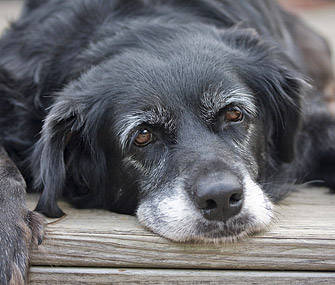
A dog that is seven years or older is considered middle- to senior- aged. Like humans, when dogs reach their ‘golden years’, their movements and metabolism start to slow. Their bodies have difficulty absorbing nutrients, and their joints and muscles become weaker. They will also start graying around the face, and their eyes become cloudy. They become more prone to diseases such as arthritis, diabetes heart disease, kidney failure, and even cancer.
The best way to take care of an aging dog is to consult with one of our excellent doctors at Central Animal Hospital in order to determine the best health care maintenance program. Even if you think that your dog is healthy, it is still advisable to bring your dog in for a check-up at least twice a year. Senior dogs have different medical and diagnostic needs, such as comprehensive blood tests, urinalysis tests, chest and/or abdominal x-rays. Furthermore, like young dogs, old dogs need regular, age-specific vaccinations.
Be extra careful about what you feed your dog. In order for older dogs to stay healthy, they need a special diet. Their food must be low in calories and rich in proteins, fatty acids, vitamins, and minerals. If you’re not sure what to feed your dog, ask your veterinarian to recommend a diet that will keep your senior pet happy and healthy.
You should also be wary about your dog’s dental care. Having healthy teeth and gums is very important. Dental diseases are not only painful but also dangerous. Dental diseases can lead to heart and kidney infections in pets. Brush your dog’s teeth and have them checked by a doctor regularly. Plaque, tartar and bacteria are very dangerous and must be removed.
Although your dog is starting to slow down, it still needs exercise. A daily walk in the morning is good for your dog. If you see the dog having difficulty standing up or walking, this may be an indication that he or she is experiencing pain. If you dog is experiencing pain, please make an appointment with a doctor right away.
